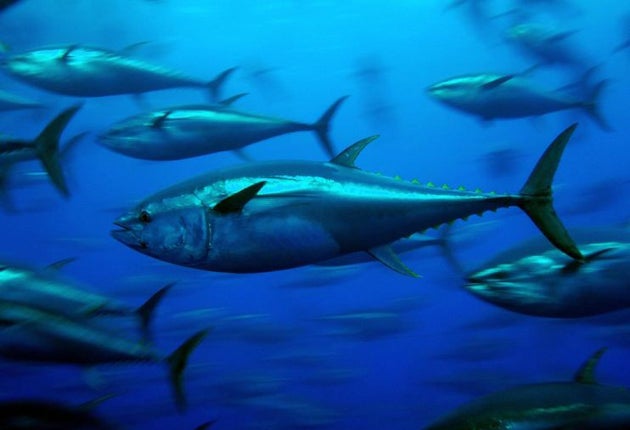EU nations split on whether to ban trade in tuna
Divisions among member states will weaken chance of swinging international vote

Your support helps us to tell the story
From reproductive rights to climate change to Big Tech, The Independent is on the ground when the story is developing. Whether it's investigating the financials of Elon Musk's pro-Trump PAC or producing our latest documentary, 'The A Word', which shines a light on the American women fighting for reproductive rights, we know how important it is to parse out the facts from the messaging.
At such a critical moment in US history, we need reporters on the ground. Your donation allows us to keep sending journalists to speak to both sides of the story.
The Independent is trusted by Americans across the entire political spectrum. And unlike many other quality news outlets, we choose not to lock Americans out of our reporting and analysis with paywalls. We believe quality journalism should be available to everyone, paid for by those who can afford it.
Your support makes all the difference.European Union countries are still arguing about introducing a ban on the trade in Atlantic bluefin tuna. Conservationists say that such a ban is the only way to save the over-fished species from extinction.
The proposal is top of the agenda for the conference of the Convention on International Trade in Endangered Species (Cites), which begins in Doha at the end of next week. The EU is divided over the issue between countries which have major tuna fisheries themselves, such as France, and those which do not, including Britain.
If adopted in full, the plan, which was put forward by Monaco, would save one of the sea's most majestic fish from vanishing. Its highly-prized and hugely-valuable flesh is much in demand, principally from the Japanese. A single 500lb tuna fetched £111,000 on the Tokyo fish market two months ago, making it the most valuable fish ever sold.
By listing the bluefin on Cites' Appendix 1, all international trade in the species would be banned, and the Japanese, the biggest buyers by far, would no longer be able to purchase the thousands of tonnes of tuna caught by European fisheries each year. The end of the Japanese trade would undoubtedly torpedo the demand which is driving overfishing.
A streamlined predator which can grow to 12 feet in length, weigh half a tonne, and travel rapidly through the water, Thunnus thynnus, the bluefin tuna, has been celebrated for its culinary qualities since antiquity.
It was once plentiful, but stocks are now quickly tumbling, and there are widespread fears that it could soon become commercially extinct. It migrates from the Atlantic each year to spawn in the Mediterranean, where much of the fishery is concentrated.
The EU's member states have been arguing about the trade ban proposal since it was first advanced last year. However, although the EU's executive branch, the European Commission, finally recommended 10 days ago that member states should back it, it is becoming clear that substantial differences still exist with the community.
In particular, Europe's six major tuna fishers – France, Spain, Italy, Greece, Malta and Cyprus – want an exception to be made for "artisanal fisheries", using local fishing boats as opposed to "industrial" vessels.
But "artisanal" is not yet precisely defined, and it is clear that local fishing fleets could themselves be responsible for thousands of tonnes of the tuna catch which could then be sold on to Japanese buyers – thus negating the impact of the trade ban.
Britain is strongly opposed to the "artisanal" get-out clause, government sources made clear yesterday, as are other EU member states that are not involved in tuna fishing.
An official pointed out that "artisanal" fisheries might be responsible for between 10 and 40 per cent of the trade taking place at the moment.
Discussions are continuing in Brussels between officials, but if agreement cannot be reached the issue will have to go to a meeting of ministers.
The issue of the 27 EU member states taking a common line is key, as the European lobby is likely to swing votes if it is united. To secure the listing of the bluefin on the Cites Appendix 1, two-thirds of the delegates must vote in favour of the ban. Cites currently has 175 member nations.
The Doha meeting will also consider proposals to ban trade in polar bears, red coral and some sharks, including the probeagle and the spiny dogfish – the "rock salmon" of old-fashioned fish and chip shops in Britain – as well as proposals to tighten the trade in body parts of rhinoceroses and tigers.
It will further consider a request from Tanzania and Zambia to sell their stocks of legally held ivory – something Hilary Benn, the Environment Secretary, has already said Britain will oppose.
Join our commenting forum
Join thought-provoking conversations, follow other Independent readers and see their replies
Comments